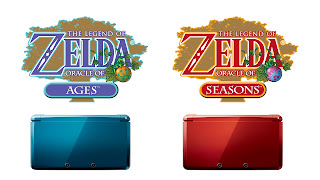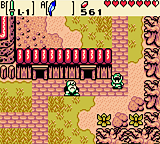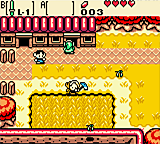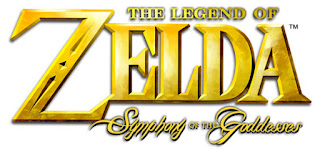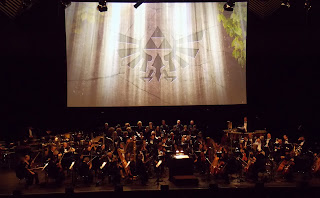This report was originally published on ZeldaChronicles (formerly known as ZeldaEurope) and got translated for this blog in 2022 by the same author.
It poured yesterday in Berlin... Maybe that's because the Song of Storms was rehearsed in the Tempodrom, but it didn't stop the many Zelda fans from gathering in front of the building despite the bad weather, yearning for the admission. And I've been there as well, where I want to share my impressions from this exceptional concert.
The idea for the Symphony of the Goddesses came from the three concerts in London, Tokyo, and Los Angeles, which took place in 2011 in celebration of the 25th Anniversary of the Zelda series. Out of this came the current line of concerts by Jason Michael Moore Productions, which has toured through 20 cities in the US and Canada last year. Afterwards the Symphony of the Goddesses also went international with additional concerts in Sydney, London, Paris, and now finally Berlin.
And there I was, in the rain, at the gates of the Tempodrom, where the concert was taking place. Maybe it was the bad weather, maybe the German fans aren't as big of an extrovert, but there weren't many crazy cosplayers to be seen during the event. A Link here, a Medli there, but for the most part it was just Zelda T-shirts and accessories, like a dashing Ezlo cap. In any case, it felt great to be with like-minded people, who were all there for the same reason: The Legend of Zelda.
In the lobby you were able to buy some Symphony of the Goddesses merchandise: a T-shirt for 25€ and a poster for 10€. This is where most of the crowd was, but this didn't matter, as long as there was something with "Zelda" written on it. And unlike in London, where everything was sold out rather quickly, they had enough for everyone, so that you could still buy something after the concert and even get one of the booklets, which were originally reserved for the 99€ tickets. The booklet introduces you to the main staff behind the Symphony of the Goddesses, as well as all 16 mainline Zelda games via artworks and their covers, combined with some quotes from the media, telling you about the momentous experience of Zelda in English, German, and French.
Past by the merchandise addicts you would find your way into the large concert hall, where the actual event was going to happen. The "cheaper" seats on the upper tier were actually not too bad – you have a great view on the whole orchestra, unlike down in the "manège" (the Tempodrom is based on a circus tent, where originally it was even housed inside one), though there you're closer to the musicians.
Said seats in the circus ring were fully taken, as were the ones in the lower and middle tiers, but the four outer blocks of the upper tier were almost empty, where they've probably redistributed some seats, giving a sad impression. So, it was not full house, but considering that the the concert was right in the middle of the week they should be happy with the sales numbers.
During the wait you could listen to different background musics from the Zelda series, which included tracks from Four Swords Adventures or the Forest Temple music from Ocarina of Time – songs that weren't part of the concert, but offered some more variety during this evening.
A rare sight were the many Nintendo 3DS users, who used the waiting times to polish the buttons of their handhelds. This was probably due to the limit of ten StreetPass encounters in the StreetPass Mii Plaza, which compelled some people to trade puzzle pieces and play StreetPass Quest before and after the concert, as well as during the intermission, just so that more Miis can move up... If you could be bothered with this, you certainly had the chance to complete some puzzles, which is a rare opportunity.
But StreetPass, merchandise, and cosplay were just small distractions. The real reason why we were all there was the wonderful music as played by the German Film Orchestra Babelsberg, accompanied by the Berlin Military Chorus. The symphony was composed by Chad Seiter, who has worked together with Michal Giacchino on different J. J. Abrams productions, like LOST or Star Trek.
The orchestra was conducted by the young Eímear Noone, who is known for her works on various Blizzard Entertainment titles. The Irishwoman was already the conductor during the recordings for the 25th Anniversary Special Orchestra CD, which was part of the Limited Edition release of Skyward Sword. Her German is pretty good, by the way, where she has used her language skills to introduce herself after the overture.
Then the producer entered the stage, Jeron Moore, who did so several times to announce the next pieces and explain the intention behind them. Moore revealed himself as a Zelda fan of the first hour, where he wanted to express his passion for the legend with this production, and this was clearly noticeable. With confidence he introduced the different compositions and he had a knack of enchanting the audience. There was a real Zelda fan in front of us, who let this unique experience come true.
Sadly, his interpreter wasn't as confident, who was there to translate Moore's word into German for the audience, but did so miserably. Not only was he acting like a fool on drugs, it seemed like he has never even heard of Zelda before the concert and therefore was unable to conceive Moore's statements up to a point where he stopped doing his job altogether. He actually translated the titles of the games into German, which is just confusing, because the games still have their English titles here, and even the title of the whole event, incorrectly so, where it turned into the "symphony FOR the goddesses". It seemed like the actual translator couldn't attend and instead they had brought in some comedian as a replacement.
Luckily, the majority of Zelda fans have sufficient command of the English language, so that Moore was able to reach the audience despite the lack of a proper translator. After a while it even felt like this whole act was intended to create some laughs. But for those who don't speak English this was certainly a nuisance, because they didn't have a real chance of understanding Moore. And for everyone else it was just embarrassing.
The poor translations aside, the selection of music was certainly satisfactory. If you have listened to the 25th Anniversary CD before, then some pieces that were played on this evening will have been familiar to you. But of course it's a whole other experience to have them performed by a live orchestra right in front of you. It's almost surreal. And more than half of the compositions weren't actually part of the CD for a whole new experience.
The full program was as follows:
- "Overture"
- "Dungeons"
- "Kakariko Village"
- "Songs of the Hero"
- "Prelude ~ The Creation of Hyrule"
- "Movement 1: Ocarina of Time"
- "Movement 2: The Wind Waker"
- "Fairy Fountain"
- "Movement 3: Twilight Princess"
- "Movement 4: A Link to the Past"
- "Ballad of the Wind Fish"
- "Gerudo Valley"
- "Suite from Majora's Mask"
The Overture was actually the 25th Anniversary Medley, which was played during E3 2011 to start this whole line of Zelda concerts. With "Dungeons" the musical journey went into the underworld of the first four Zelda titles, including the Light World dungeons theme from A Link to the Past, the Bottle Grotto from Link's Awakening, and of course the classic Level music from The Legend of Zelda. With the fan favorite Palace theme this also offered the only piece from Zelda II - The Adventure of Link – a game that could have been featured more richly.
"Kakariko Village" covered both the traditional version from A Link to the Past and Ocarina of Time, as well as the version from Twilight Princess, which was already part of the Orchestra CD. "Songs of the Hero" then was devoted to the different Ocarina songs from both Nintendo 64 classics: the Song of Time, the Serenade of Water, the Song of Healing, and the Song of Storms.
At its core the Symphony of the Goddesses was meant to be a classic symphony, however, divided into four movements. These movements featured the games Ocarina of Time, The Wind Waker, Twilight Princess, and A Link to the Past, each with their own extensive medley. It started with Ocarina of Time, specifically the song about the creation of Hyrule – very befitting for a "Symphony of the Goddesses". They've also played the title theme, the Deku Tree theme, and the battle against Ganondorf, amongst others.
Another highlight then came with the second movement. For the medley about The Wind Waker conductor Eímear Noone put away her normal baton and took something out of a casket decorated with a Triforce: it was the Wind Waker, which she then used to conduct the rest of the concert for some guaranteed cheers and applause. The medley itself was mostly the same as the one on the Special Orchestra CD, which was also true for Twilight Princess in the third movement.
There was a short break after "The Wind Waker", which ended with the classic "Fairy Fountain" melody, which has accompanied the main menus of many Zelda games since A Link to the Past. This is also part of the Orchestra CD, in case you're interested.
Moore compared the four movements with the split timeline from Hyrule Historia and then asked the audience what would come next. Apparently, in Paris one of the answers was "Skyward Sword", which by the way only got featured in the Overture via the Ballad of the Goddess, but the German fans were a little bit "smarter" and welcomed A Link to the Past as the finale with applause. Many of the great melodies in Ocarina of Time, like Zelda's Lullaby, originated from this game, which is why it certainly deserved a movement of its own. And you can never get enough of the infamous Dark World theme anyway. So, A Link to the Past was certainly one of the highlights of the concert and a fantastic conclusion to the symphony.
I could have informed myself about the entire program upfront, but I didn't and seemingly wasn't the only one, where we got surprised with not one, not two, but three encores. It led to a total of four standing ovations before the concert was actually over! People applauded until their hands hurt. But it was well deserved and the audience ecstatic about every additional track announced by Moore.
First of the encores was the "Ballad of the Windfish", where words will fail to describe it beauty and this put me right back into my childhood, where I've played the eight Instruments of the Sirens at Mt. Tamaranch with the GameBoy in my hands. Then it was the turn of one of the most popular tracks from Ocarina of Time: "Gerudo Valley". Equally delightful were the bizarre sounds for Majora's Mask, a game that would have been dearly missed otherwise. In its suite they've played the opening, some of Majora's themes, Calling the Giants, and Clock Town.
Those who were listening with a trained ear might have caught some musical mistakes, but overall you have to say that the Film Orchestra Babelsberg really stood behind the music and gave it their all. On the big screen you could occasionally see some interesting closeups of the performers and follow the interaction of the different instruments.
However, the screen got mainly used for showing different ingame scenes, which were perfectly coordinated with the music, even with some excellent transitions. For example, as the music of Clocktown arrived at the Third Day, the screen displayed the "Dawn of the Final Day" message. It's also noteworthy that they didn't shy from using some more curious footage. Like, you could watch a Gossip Stone going up like a rocket, Link being attacked by a Cucco Revenge Squad, or a seagull flying around Windfall Island. But they also didn't shy from spoilers, where they've shown the final boss battles in A Link to the Past, Ocarina of Time, Majora's Mask, The Wind Waker, and Twilight Princess.
The sublime synergy of music and gameplay footage certainly caused some goosebumps in the audience and also some tears, the good kind. Dwelling in childhood memories, crying in joy, cheering... The concert was pure emotions. Sadly, with the younger audience there were also some who confused such a concert for a soccer game, which can be annoying. But luckily, this stayed within limits.
The Symphony of the Goddesses is without a doubt one of those evenings where you wish that it never ends. In any case, it leaves you wanting more, where it would be nice to have an album with the full program in the future. And some games, like Skyward Sword or The Minish Cap, didn't get much attention (though, in case of the Capcom games this may be a rights issue), where it would be nice to hear more from them in the upcoming "2nd Quest" program, which starts in Atlanta on June 6th.
Another important part of the evening were the many Zelda fans. All of us are connected by the beautiful memories of playing the Zelda games, which we all shared during this evening's entertainment. You may be a weirdo for some when you're listening to the Dark World music instead of the newest David Guetta song, but not in this place. At the Symphony of the Goddesses you are with other Zelda fans, who love this music as much as you do. And it feels great.
The music and the people made this evening into an unforgettable experience, where I would be happy to visit the second season of the Symphony of the Goddesses if it were to return to Germany.

